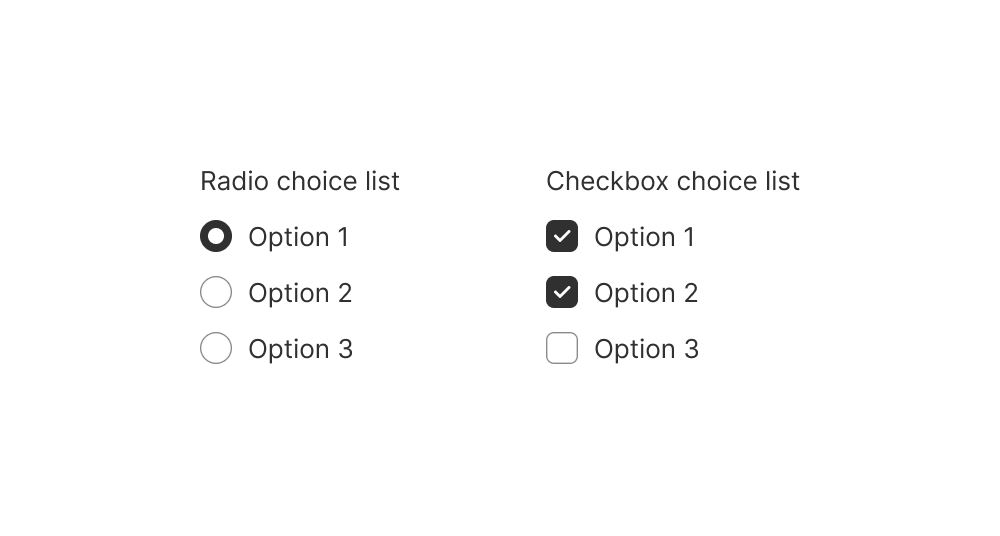Choice
Use this component if you need to group together a related list of interactive choices as radio buttons or checkboxes.
Anchor to choicelistpropsChoiceListProps
- Anchor to choiceschoicesChoiceProps[]
- Anchor to defaultValuedefaultValuestring | string[]
A default value to populate for uncontrolled components.
- Anchor to disableddisabledboolean
Whether the field can be modified.
- Anchor to errorerrorstring
Indicate an error to the user. The field will be given a specific stylistic treatment to communicate problems that have to be resolved immediately.
- Anchor to multiplemultipleboolean
Whether to allow selection of multiple choices
- Anchor to namenamestring
An identifier for the field that is unique within the nearest containing
Formcomponent.- Anchor to onChangeonChange(value: string | string[]) => void
Callback when the user has finished editing a field. Unlike
callbacks you may be familiar with from React component libraries, this callback is not run on every change to the input. Text fields are “partially controlled” components, which means that while the user edits the field, its state is controlled by the component. Once the user has signalled that they have finished editing the field (typically, by blurring the field),is called if the input actually changed from the most recentvalueproperty. At that point, you are expected to store this “committed value” in state, and reflect it in the text field’svalueproperty.This state management model is important given how UI Extensions are rendered. UI Extension components run on a separate thread from the UI, so they can’t respond to input synchronously. A pattern popularized by controlled React components is to have the component be the source of truth for the input
value, and update thevalueon every user input. The delay in responding to events from a UI extension is only a few milliseconds, but attempting to strictly store state with this delay can cause issues if a user types quickly, or if the user is using a lower-powered device. Having the UI thread take ownership for “in progress” input, and only synchronizing when the user is finished with a field, avoids this risk.It can still sometimes be useful to be notified when the user makes any input in the field. If you need this capability, you can use the
prop. However, never use that property to create tightly controlled state for thevalue.This callback is called with the current value of the field. If the value of a field is the same as the current
valueprop provided to the field, thecallback will not be run.- Anchor to readOnlyreadOnlyboolean
Whether the field is read-only.
- Anchor to valuevalueT
The current value for the field. If omitted, the field will be empty. You should update this value in response to the
callback.
ChoiceProps
- accessibilityLabel
A label that describes the purpose or contents of the element. When set, it will be announced to users using assistive technologies and will provide them with more context. When set, any children or `label` supplied will not be announced to screen readers.
string - checked
Whether the choice is checked or not
boolean - disabled
Whether the field can be modified.
boolean - error
Indicate an error to the user. The field will be given a specific stylistic treatment to communicate problems that have to be resolved immediately.
string - id
A unique identifier for the field.
string - label
Content to use as the field label.
string - readOnly
Whether the field is read-only.
boolean
export interface ChoiceProps
extends AccessibilityLabelProps,
Pick<
InputProps<string>,
'disabled' | 'label' | 'id' | 'readOnly' | 'error'
> {
/**
* Whether the choice is checked or not
*/
checked?: boolean;
}Simple ChoiceList example
Examples
Simple ChoiceList example
React
import {render, ChoiceList} from '@shopify/ui-extensions-react/admin'; render('Playground', () => <App />); function App() { return ( <ChoiceList name="Company name" choices={[ {label: 'Hidden', id: '1'}, {label: 'Optional', id: '2'}, {label: 'Required', id: '3'}, ]} /> ); }JS
import { extension, ChoiceList, } from '@shopify/ui-extensions/admin'; export default extension( 'Playground', (root) => { const blockStack = root.createComponent( ChoiceList, { name: 'Company name', choices: [ {label: 'Hidden', id: '1'}, {label: 'Optional', id: '2'}, {label: 'Required', id: '3'}, ] }, ); root.appendChild(blockStack); }, );
Preview
